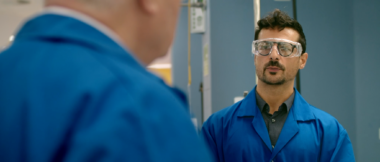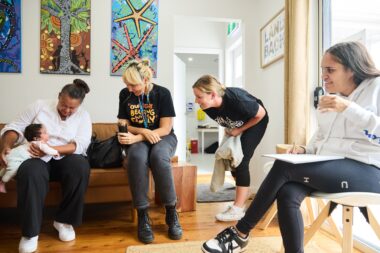National Stroke Week, run by the Stroke Foundation, runs from 7 – 13 August, 2023, and aims to raise awareness about the prevention, management and treatment of stroke in Australia.
Monash experts are available to discuss strokes, and the importance of awareness of the disease this week.
- Stroke is a leading cause of death and disability in Australia
- Women are twice as likely to die from stroke than breast cancer
- Stroke is a serious public health issue and costs the Australian economy more than $26 billion in lost wellbeing and premature death each year
- The impact of stroke on survivors and carers can be significant, ranging from profound limitations relating to self care, movement and communication to difficulty with balance, ongoing fatigue and loss of concentration
- Rehabilitation treatments offer enormous hope to reducing disability: there is a known 85 per cent reduction in direct cost from stroke when disability is reduced.
Associate Professor Monique Kilkenny, Head of Big Data, Epidemiology, and Prevention Division, Stroke and Ageing, Monash University
Contact details: [email protected]
The following can be attributed to Associate Professor Kilkenny:
“Around the world, a stroke occurs in every 1 in 4 people in their lifetime. Right now in Australia, there are over half a million people who have experienced a stroke. Stroke is one of the leading causes of death and disability. The number one risk factor for stroke is high blood pressure.
“Knowing the FAST signs of stroke, and responding promptly by calling 000, can drastically improve the outcomes for someone experiencing a stroke. This week, have a conversation with your loved ones about the signs of stroke and monitoring blood pressure – the biggest risk factor for stroke. There have been major advances over the last decade in the treatments available for patients with stroke – but reaching hospital in time remains the biggest challenge.
“In collaboration with the University of Tasmania and the Stroke Foundation, we are developing and testing a new digital platform, “Love Your Brain”, to educate the community about stroke. There is huge public demand for information about how to stop stroke, which can be met by our “Love Your Brain” digital platform.
“National Stroke Week gives us the opportunity to be reminded about stroke and the importance of prevention and management of risk factors such as high blood pressure, high cholesterol and diabetes.”
Professor Dominique Cadilhac, Co-director and Research Lead of the Stroke and Ageing group, School of Clinical Sciences, Monash University
Contact details: 0403 253 912 or [email protected]
The following can be attributed to Professor Cadilhac:
“Stroke is a catastrophic health event for individuals and families. Depending on which part of the brain is affected means the ability to think, speak, feel or move your body can be impacted. But knowing the signs of stroke and acting FAST in calling an ambulance and going to hospital is essential to avoiding life long disability or death from stroke.
“There have been major advances over the last decade in treating stroke with proven benefits in reducing its complications. However, as the number of survivors of stroke increases more needs to be done at the public health level to reduce the risk of stroke through primary prevention and in discovering new therapies to reduce disability or better support people and their caregivers living in the community after stroke.
"The Stroke and Ageing Research group are at the forefront of research in preventing, treating and innovating to support the long term needs of people living with stroke.
“National Stroke Week gives us the opportunity to be reminded about stroke, its warning signs and symptoms, and how it remains a major health challenge in this century worldwide, including in Australia.”
Professor Natasha Lannin, Head of the Brain Recovery and Rehabilitation Group, Department of Neuroscience, Monash University
Contact details: 0417 135 153 or [email protected]
The following can be attributed to Professor Lannin:
“Rehabilitation is a crucial part of recovery for stroke survivors. In addition to rehabilitation treatments that are based on research evidence, it is important that Australians are given the ability to choose both the type and the timing of their rehabilitation.
“In collaboration with international researchers from Nottingham University, our group have completed a randomised controlled trial testing the benefit of early rehabilitation targeting work and working after first stroke. Results are promising, but scaling up this complex intervention is not a straightforward task here in Australia. We are excited to have received funding from the Medical Research Futures Fund to complete an implementation trial to test this and these results are expected early 2025.
"The Brain Recovery and Rehabilitation Research group lead world-first clinical trials testing the efficacy of rehabilitation interventions, with trial experience involving both specific interventions such as movement retraining to prevent falls after stroke, as well as delivery of complex rehabilitation services, such as vocational rehabilitation to support the transition to working again after a stroke.
“National Stroke Week gives us the opportunity to advocate for improved post-hospital rehabilitation across Australia, irrespective of postcode. Research to support delivery of rehabilitation using new technologies, personalised medicine and specialist hubs will see Australia tackle this challenge: delivering best-practice rehabilitation at the right time and right place.”
For more Monash media stories visit our news & events site: monash.edu/news
For more information on National Stroke Week: https://strokefoundation.org.au/what-we-do/prevention-programs/national-stroke-week
For any other topics on which you may be seeking expert comment, contact the Monash University Media Unit on +61 3 9903 4840 or [email protected]


